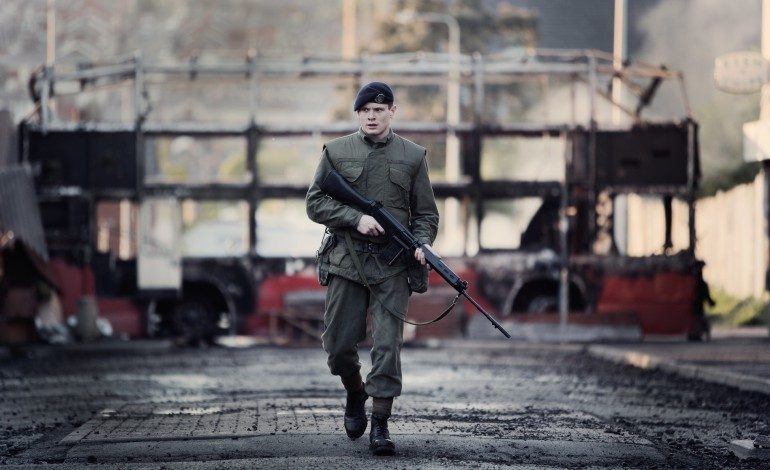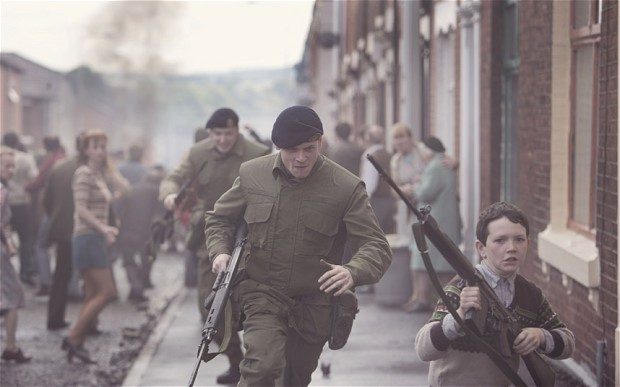The Troubles might be the most understated name for a conflict since The War of the Roses. It’s an almost coyly polite moniker for a conflict that spanned three decades and claimed the lives of thousands of people, many of them civilians. Yann Demange’s directorial debut ’71 goes a long way towards capturing the disorientating and manic violence that exploded in Northern Ireland in the early 1970’s.
The film follows Gary Hook (Jack O’Connell, Unbroken), a young British soldier fresh out of boot camp. His unit is sent into Belfast as riots and violence begin escalating throughout the city. When a routine house search goes wrong, Hook is cut off from his regiment and soon finds himself running for his life on the chaotic streets of Belfast as he’s pursued by both the Provisional IRA and the British Army’s Military Reaction Force.
It’s a beautifully simplistic setup, and it gives the film room to explore some of the larger issues at play without losing any of the war’s visceral punch. ’71 is a film that does not stop. The 99 minute run time is packed tight; the film has little exposition to speak of, dropping us directly into the bombed out streets of Belfast in a narrative move that mirrors the disorienting world Hook finds himself plunged into. Most of the action is filmed with handheld cameras, and some of the chase sequences ride the line between tension and utter chaos. Demange’s direction, Gregory Burke’s screenplay, and Tat Radcliffe’s cinematography always feel unified, and to see this level of narrative and stylistic synchronicity from a creative team relatively new to features is very impressive.
While the film does maintain an overbearing sense of tension from start to finish, this isn’t what you’d call a traditional action thriller. Its momentum isn’t punctuated by increasingly intricate or elaborate fight sequences, but rather by a progressively sharpening sense of dread and desperation. Hook spends most of his time running or hiding. He’s not an action hero, he’s a terrified man fighting for his life. This isn’t a battle for retribution; it’s not a battle at all but a clawing scramble for survival.
While ’71 centers around a politically divisive time, it isn’t an overtly political film. Burke’s screenplay illuminates the profound violence and corruption perpetrated by both sides of the conflict. We see an uninformed military operating violently inside a chaotic city run by an increasingly fractured IRA. The film makes it very clear: this is not a fight between good and evil. As multiple characters state throughout the film: “The situation is confused.” One of the most illuminating moments comes during one of the film’s quieter scenes, when an injured Hook talks with an Irish woman played by Charlie Murphy (Philomena), who mentions she has family in Nottingham. Hook, from Derby, tells her that Derby and Nottingham “don’t really get on.” When she asks him why, he doesn’t have an answer. Tribal differences often dissipate on a personal level; this is an idea that resonates through the entire film.
Performances are excellent all around. Jack O’Connell is effective as Hook, capturing the confusion and moral dissolution that plagues his character. Other stand-outs include Killian Scott (Calvary) and Sean Harris (Prometheus), who play men on opposite sides of the conflict vying to get to Hook before the other. However, what makes ’71 so effective is that it manages to make the larger political conflict the real focus of the film. This isn’t a film about Hook, it’s about Ireland in 1971. Despite being filmed in Northern England, the film does a fantastic job recreating Belfast and the violence that plagued the city. Demange is using this story as an analogue for a much larger narrative, but the fact that he never loses sight of Hook’s particular story is what makes this a captivating film.
The Verdict: 4 out of 5
’71 is not a typical action thriller. This is not a film of great men performing acts of courage and heroism to combat villains. This is a film about people committing acts of terror and acts of humanity. It’s a deceptively simple and effective film that captures an immensely complicated era. ’71 is a film that is as intelligent as it is thrilling, and for that it comes highly recommended.




